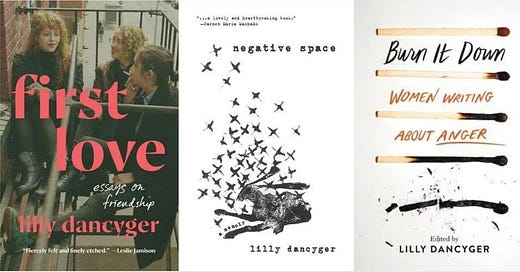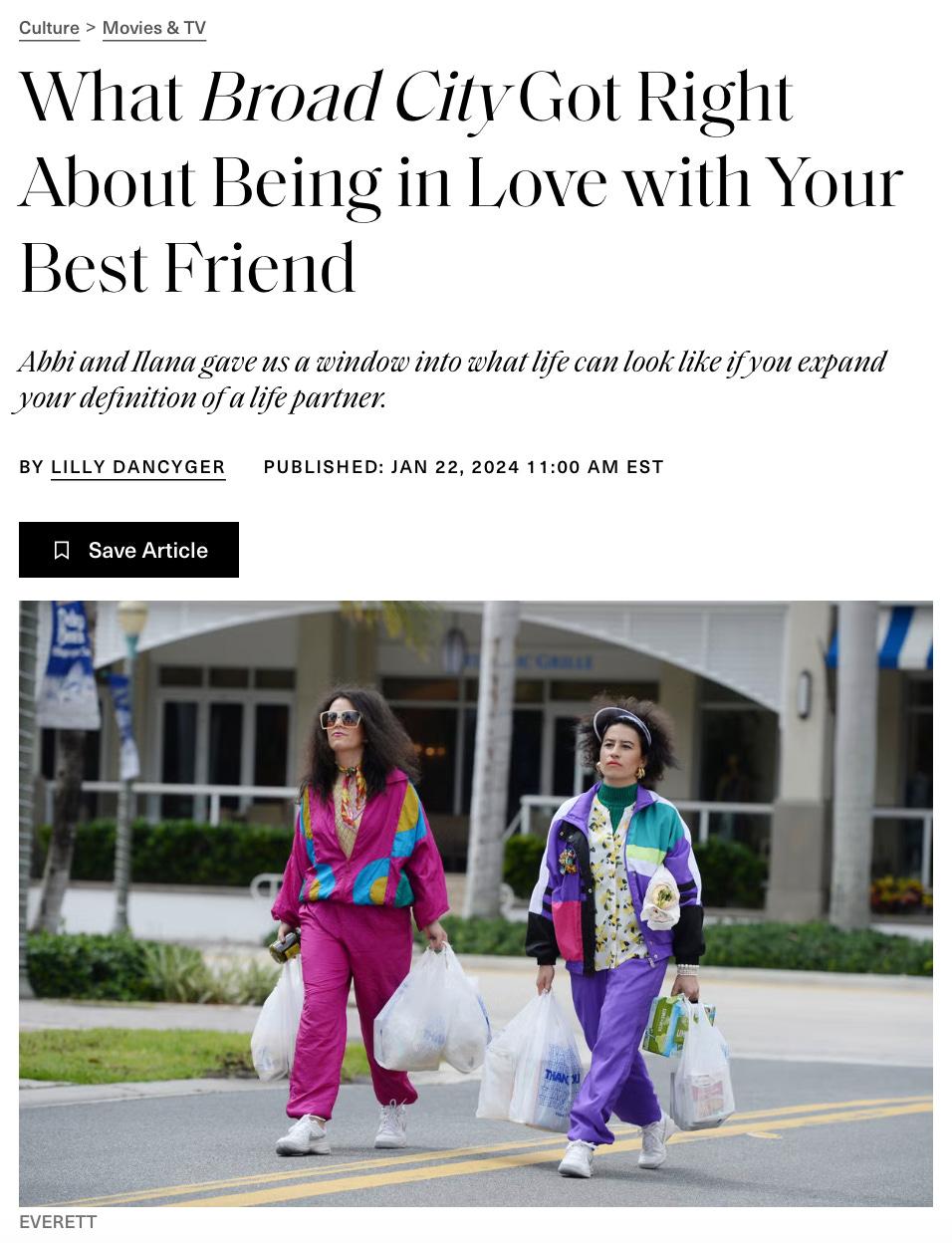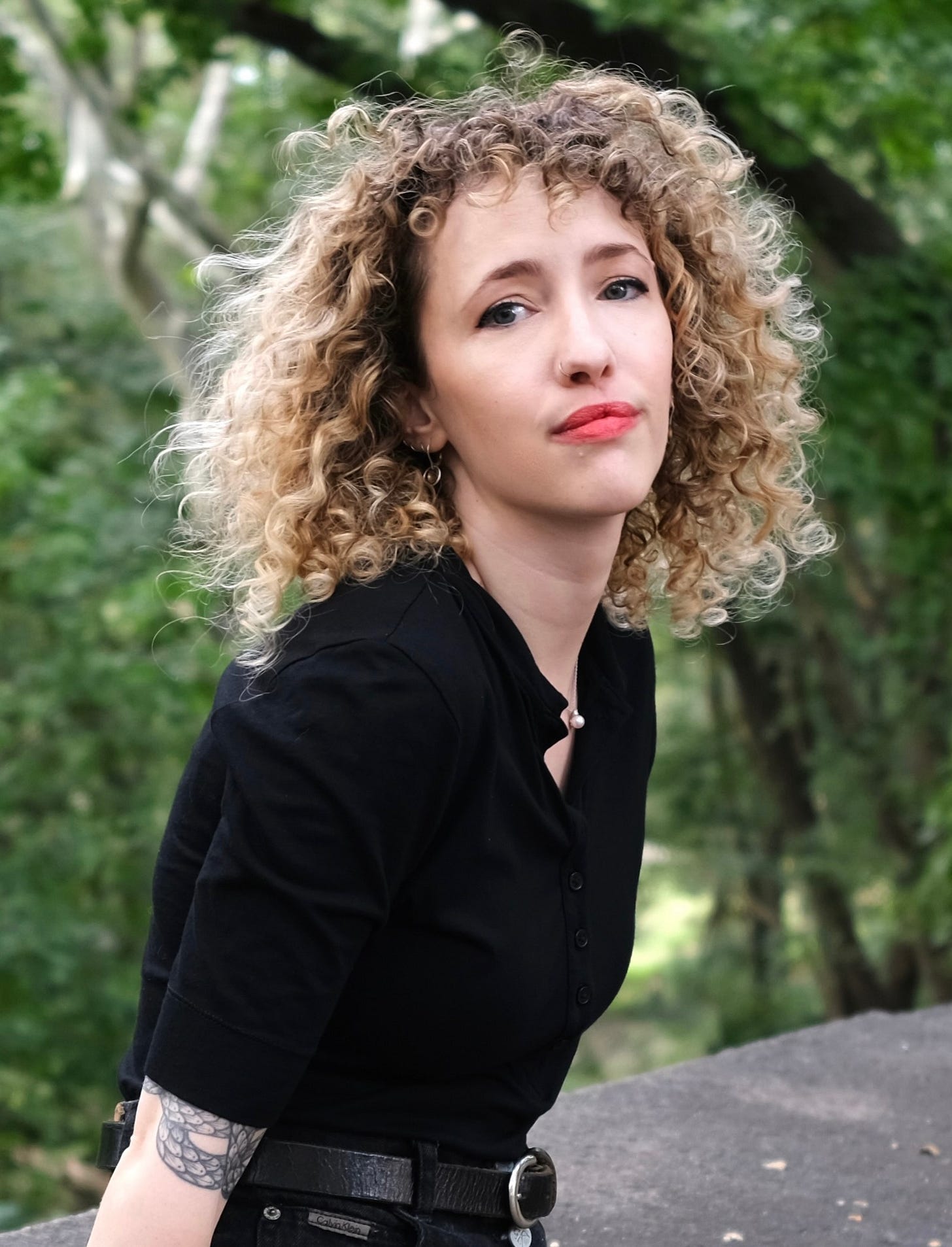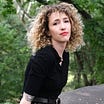In Defense of Publicity Essays
Lilly Dancyger: "I published nine essays related to my new book. Here’s how (and why)"
To kick off the month, we have a 🚨MUST-READ🚨guest post from one of my favorite writers Lilly Dancyger about “spin-off essays.”
Coming up in publishing and writing, Lilly has always been someone I look up to for her tenacity, her willingness to push herself as a narrator on the page, and the way she seamlessly braids threads in both short essays and longer form memoir. She works hard, and that work pays off.
In Defense of Publicity Essays | Lilly Dancyger
Publicity essays, spinoff essays, companion essays—whatever you call them, many authors dread writing new pieces to publish around their book launch with the aim of (hopefully? maybe?) building “buzz.” And I’ll admit that when I was getting ready for the launch of First Love, I grumbled about having to write a bunch of new essays in order to promote… a book of essays. But the truth is, writing these pieces is actually one of my favorite parts of promoting a book, and an area that I put a lot of time and effort into for both of mine. There are a few reasons for this:
Placing related pieces is one of the only parts of book publicity that an author has any control over. You can’t do much to influence which lists you’ll be on, which outlets will review your book, which celebrity will be spotted reading it by the pool. But goddamnit, you can write and pitch essays.
Maybe an obvious one, but: these essays can help you reach *new* readers. So much of book publicity involves tapping into an author’s existing networks—via social media or newsletters or even book tour events. But spinoff essays are like Trojan horses to sneak your byline (and your book title, in your bio at the end of the piece) into publications that probably have way more readers and followers than an individual author. (This doesn’t mean everyone who reads one of your essays will buy the book. Far from it. But still—they will have heard of it, which is a big step in the right direction.)
These essays can help more than just your current book. The infamous “author platform” isn’t something you build once and then that’s it. I like to think of it more like maintaining visibility. Are you getting yourself and your work out there consistently? Do people who might like your work know you exist? Publishing essays is a great way to see that they do.
Lastly… it can be fun. I’m a writer because I like to write. So writing new stuff related to my book is a lot more enjoyable for me than a lot of the other publicity stuff authors are being asked to do these days. (No, I did not make an “unboxing video.”)
For all of these reasons, I leaned hard into spinoff essays for First Love. I maybe even went a little overboard. Most publishers would be happy with an author publishing two or three spinoff pieces, I think. Over the months leading up to First Love’s launch in May and since, I’ve published nine spinoff essays. So, I thought a little behind-the-scenes rundown of how I approached these pieces might be helpful for authors getting ready to promote their own books, and wondering where to start with companion pieces.
(A quick note first: These related essays that I’m talking about are separate from excerpts. Placing excerpts around a book’s publication can also be great for visibility, but that’s a whole separate conversation.)
So, here’s a breakdown of all of my spinoff essays for First Love, and how they came to be (with more info on how I brainstormed and strategized them below, after the list):
January 22: What Broad City Got Right About Being in Love with Your Best Friend (Elle)
This one was pegged to the 10-year anniversary of Broad City’s premiere, which is why it came out so far ahead of the book (First Love came out May 7). One of the essays in First Love originally had some material about Broad City and some material about the Victorian-era concept of romantic friendship. I really didn’t want to cut that stuff from the book, but it just didn’t work in the essay. So I saved it for later, and voila!
(Process: I pitched this around to a few places and waited until I got a “yes” from Elle before I developed that cut material into a stand-alone piece.)
January 30: Looking at an Eclipse: A Braided Essay About Braided Essays (Brevity)
I thought a lot about how braided essays work and why I love to write them while writing First Love, which includes several pieces in this form. This meta craft essay was published pretty early for a spinoff essay (over three months out) because it served a double purpose of also helping me get the word out for a class I was teaching on braided essays. If it hadn’t been for that class, I probably would have held onto this one for a little longer.
(Process: This was one of those rare essays that came out fully formed, probably because I thought about it for a long time before writing. I submitted the complete piece to Brevity.)
April 25: Turning Real People Into Characters Is an Act of Translation (Writers Digest)
This piece originally appeared in Writers Digest’s March/April print issue, but the editor was kind enough to schedule the online version for a couple of weeks before First Love came out. This is a craft topic dear to my heart, so I had a lot to say.
(Process: This one was solicited, which felt pretty cool!)
May 7: Pub day. Several excerpts were published the week First Love came out, so I tried to make sure no spinoff essays came out that same week so they didn’t compete for attention.
May 16: Lilly Dancyger On Claiming Space For Writing: When A New Desk Is More Than Just A Desk (Beyond, Jane Ratcliffe’s Substack)
This is the only piece I’ve published in someone else’s newsletter (until now!). It’s not exactly a craft piece, but I still think of it as in that category rather than the essays about subject matter related to the book’s content (more about these categories below). It’s about the writing life, the writing process, the experience of writing the book.
(Process: I had a draft of this one that I was pitching around when Jane reached out and asked if I might want to publish something in Beyond.)
May 24: Why You Should Let Your Family Read Your Memoir in Advance (Literary Hub)
I knew pretty early in the process of writing First Love that I was going to write a craft/process essay about how I completely reversed my policy on letting people in my life read what I’ve written about them between my first and second books. This might have been one of the first spinoff ideas I came up with.
(Process: I pitched this one before writing it.)
May 28: Reading My Way to a Decision About Motherhood (The Offing)
Like the Broad City piece above, this essay grew out of material that I cut from the book. An early draft of the essay “Mutual Mothering” in First Love had footnotes where I talked about all of the books about motherhood that I was reading while writing it. But they ended up cluttering the already long essay, so I cut them and dumped them in a new document for later. I then developed those footnotes into a stand-alone personal essay-slash-book list.
(Process: I was kind of stumped about where to send this one, so I tweeted about it. An editor at The Offing replied.)
July 20: Being a Bridesmaid Is Great, Actually (Slate)
This piece falls into the category of essays I most often hear people encouraging authors to write related to their books: the topical op-ed. These can be harder to plan ahead if you’re pegging them to the news cycle, but the discourse about how much it sucks to be a bridesmaid is evergreen, so I thought it would be fun to write a kind of snarky, kind of heartfelt piece about how that was not my experience at all.
(Process: I submitted the full draft of this one. It took a few tries before it landed at Slate.)
August 4: We Need to Talk About Our Ex-Best Friends (Elle)
This is another kind of topical op-ed-y piece, but it has some reporting in it too.
(Process: This one came about in an interesting way: my publicist at Dial was in talks with Elle to potentially run an excerpt from First Love, and she mentioned to me that they were considering it for an upcoming friendship package. The excerpt didn’t work out because of timing, but since I had an existing relationship with the editors there (from the Broad City piece I published with them in January, and because they published a Q&A with me about First Love), I reached out directly and said I’d love to write an original piece for the package. The specific topic was the editor’s idea.)
September 17: Learning to Connect With Friends—Without Alcohol (The New York Times)
While I was in copyedits for First Love, looking for repeated words (I used the term “scream-singing” three times in the manuscript… during copyedits I cut it down to one), I noticed how many times I mention whisky over the course of the book. With this realization, a fully-formed essay idea sprung into my mind about the role that alcohol has played in my friendships—from skipping class in high school to drink straight vodka first thing in the morning, to bartending for a decade, to quitting drinking 18 months ago. I seriously considered blowing my deadline and delaying my pub date to add in this new piece. But I ultimately decided to write a spinoff essay about it instead.
(Process: An editor at the NYT reached out to my publicist with an invitation for me to submit an essay connected to First Love. They rejected my first attempt, so I sent three more pitches, and this was the one they chose. This conversation started in March, two months before the book came out, but it took a long time to get edits and finalize the piece. But here it is—my NYT debut!)_
In addition to these nine pieces, there are actually two more I’m still looking for homes for: A short personal essay about platonic sleepovers and intimacy in adult friendships that for some reason has been really hard to place (I finally got an acceptance for it after twelve rejections, but then withdrew it when the publication wouldn’t budge on their “work for hire” contract, which I avoid on principle); and a long, meaty essay that I cut from the book in its entirety at the last minute. I entered it in some essay contests that have long turnaround times, so it’ll be a while before that one publishes.
I see these essays as falling into three distinct categories (and some essays fall into more than one):
-Craft/process essays (the Brevity piece about braided essays, the Writers Digest piece about characters in memoir, the essay about my desk for Beyond, and the Lit Hub piece about letting people in your life read your memoir)
Topical essays related to the subject matter of the book (the Broad City/romantic friendship and friendship breakup pieces in Elle, the Offing piece about motherhood books, the Slate piece about being a bridesmaid)
Repurposed material cut from the book (the Broad City piece and the motherhood books piece)
I think this variety kept the process from feeling too repetitive and boring for me (and hopefully for readers), coming at it from lots of different angles rather than trying to encapsulate the core of the entire book and then regurgitate that encapsulation over and over again. Most of these essays don’t repeat ideas from the book, even if they are adjacent. This is where a lot of writers get tripped up, I think—on the idea that spinoff essays need to be essay-length versions of the entire book, or that you have to pick one “message” and then find as many timely news cycle excuses to repackage it as possible. Becoming a “subject matter expert” and writing timely op-eds is not the only way to publish original pieces related to your book!! (Tajja Isen wrote a great piece about this misconception.)
I think of these essays more as an opportunity to say things I didn’t get a chance to say directly in the book—like, I mentioned being the maid of honor at my friend Carly’s wedding in an essay in First Love, but I didn’t get to go into it in depth. And I really wanted there to be something about romantic friendship in the book, but it didn’t fit—so I made it a spinoff essay instead. When you think about it that way—getting another crack at your subject matter, an opportunity to go down rabbit holes you had to refrain from in the book itself—writing these pieces can actually be fun.
I also kept a list of potential spinoff essay ideas throughout the process of writing First Love, so I didn’t have to scramble to come up with ideas in the months leading up to book launch (a time when nobody is at their sharpest or most creative, I don’t think.) Planning way ahead like that also made it easier for me to let go of ideas (and even material) that didn’t fit during the book-writing process—because I was always aware that there would be other opportunities. That in fact, it would be to my benefit to save some ideas for later. In that way, planning and developing these essays became a natural extension of the writing process, rather than something I had to force myself to do.
Ultimately, I don’t know if these essays sold books! The Times piece was the only one that caused a measurable bump in book sales numbers—partly because it was the biggest outlet, but I think also because it was late enough in the publication cycle that I could attribute the bump to that one thing. But regardless, I enjoyed writing these essays, I broke into some new-to-me outlets with them, and they helped keep my name out there for most the entire year my book was published, rather than the usual brief window of coverage that dies down and leaves an author wondering what just happened and what they should be doing next. So I certainly don’t think they hurt.
Lilly Dancyger is the author of First Love: Essays on Friendship (The Dial Press, 2024), and Negative Space (SFWP, 2021). She lives in New York City, and is a 2023 NYSCA/NYFA Artist Fellow in nonfiction from The New York Foundation for the Arts. Her writing has been published by The New York Times, The Atlantic, The Washington Post, Rolling Stone, Playboy, Elle, and more. She writes the Substack newsletter The Word Cave.














Thank you for this wonderful, helpful essay. The number of stories you created and published in outstanding outlets is inspiring and the result of your talent and persistence. I am one of the readers who discovers new writers through these spin-off articles.
Loved reading this truly helpful piece. I learned so much from your class at the Southampton Writers Conference, especially about the braided essay, and the pieces I wrote during that workshop propelled me to finish my book manuscript. I will definitely keep these insights in mind as I search for an agent or small press and hopefully (fingers crossed) get my book published. Thank you so much for sharing about your process. Your talent and success inspires me.